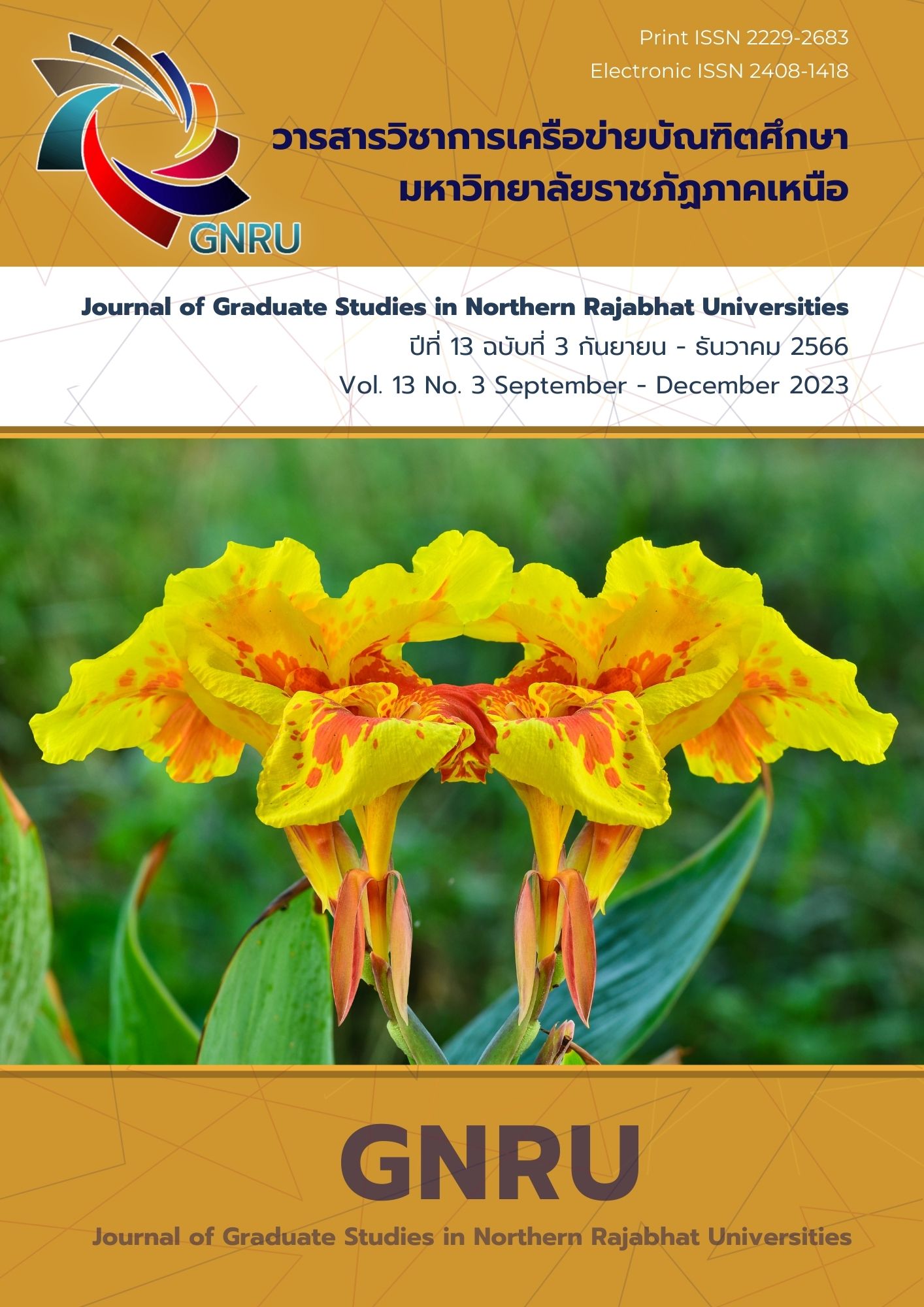7 THE EFFECTS OF COOPERATIVE LEARNING WITH STAD TECHNIQUE AND MULTIMEDIA FOR MUSIC SUBJECT ACHIEVEMENTS AND ATTITUDES OF PRATHOMSUKSA 6 STUDENTS
Main Article Content
Abstract
The purposes of this research were to 1) compare students’ music subject achievements before and after the cooperative learning with STAD technique and multimedia, 2) compare students’ music subject achievements before and after using the cooperative learning with STAD technique and multimedia at the criterion of 70 percent, and 3) study students’ music subject attitudes towards learning by cooperative learning with STAD technique and multimedia. The sample group was 30 students of Prathomsuksa 6 at Wat Klong Yang Prachapattana School through cluster random sampling. The data collection instruments included 1) the lesson plans of cooperative learning with STAD technique and multimedia, 2) the music subject achievement test, and 3) the music subject attitude questionnaire. The statistics used to analyze the data were average, standard deviation, dependent-sample t-test, and one-sample t-test.
The research findings showed: 1. The students’ learning achievements in music subject after learning with cooperative learning using STAD technique and multimedia were higher at the level of .05 significance. 2. The students’ learning achievements in music subject after learning by cooperative learning with STAD technique and multimedia were higher than the 70 percent criterion at the level of .05 significance. 3. The students’ attitudes towards the cooperative learning with STAD technique and multimedia in music subject were at the high level ( = 4.28).
Article Details
References
Chalapirom, S. (2020). Effects of Cooperative Learning with Jigsaw Technique on Multimedia
Learning Achievement of Chinese language for Pratomsuksa 5. Curriculum and
Instruction. Nakhonsawan Rajabhat University.
Hirunruk, S. (2021). Musical Knowing in Music Learning and Teaching. Wipitpatanasilpa Journal
of Arts, Graduate, 1(1), 28-42.
Khammanee, T. (2015). Pedagogy : Knowledge management for learning efficiency (edition
th). Bangkok: Chulalongkorn university.
Ministry of Culture. (2016). National Strategy 20 years. Bangkok: Ministry of Culture.
Mulkhum, S. & Mulkhum, O. (2009). 21 ways for development thinking skill (Published 3nd)
Bangkok: Pappim Publisher.
Noiwilai, A. (2014). The Effects of recorder-flute lesson following Carl Orff with Cooperative
Approach STAD Technique for Pratomsuksa 4.
Nontaso, S. (2021). The Results of Direct Instruction Model on Academic Achievement,
Initiative Thinking and the Students’Opinions using Microsoft Publisher 2003 Program for
Grade 6, Demonstration School, Khon Kaen University (Mordindang). Khon Kaen
University.
Phubanchuen, S. (2020). The Development of Learning Activities by Direct Instruction Model
and Cooperation Learning STAD Technique focusing on Students skills, Learning
Achievement and Attitude to Word Thai Dancing Subject in Pratomsuksa 6. Journal of
Humanities and Social Sciences. Mahasarakham University, 39(5), 81-92.
Poobanchuen, M. (2014). The Development of Music Activities Series for students of Zoltan
Kodaly. [Master of Education Program in Curriculum and Instruction]. Mahasarakham
University.
Slavin. R. E. (1995). Cooperative Learning : Theory, research and practices (2nd ed.).
Boston: Ally and Bacon.
Songkhram, N. (2010). The development of Multimedia Lessons for learning. Bangkok:
Chulalongkorn University.
Sukosot, N. (2015). The development of lessons on tablet with Cooperative Learning
management of STAD technique on colorful of sounds for Pratomsuksa 2. [Master of
Education Program in Technology and Communications]. Naresuan University.
Sukpadriew, O. (2011). The effect of learning activities by using multimedial lessons with
cooperative learning by stad technique on learning outcomes and group working behavior
in mathematies subject of matthayomsuksa students. [Master of Education Program in
Educational Technology]. Silpakorn University.
Toemjai, R. (2010). A comparison of Mathematics learning achievement Entitled Applications of
Pratomsuksa 6 students by using programmed instructions in supplement to STAD
Technique and Conventional Learning Approch. [Master of Education Program in
Mathematics Education]. Rajabhat Maha Sarakham University.
Wutsan, P. (2013). GeoGebra the other interesting way for Math teacher. IPST magazine.
Year 41st, No.181 (March-April), 13-16.
Yangsuay A. & Chaipichit, D. (2019). The Development of Melodica Learning for
Pratomsuksa 4-6 by using Direct Instruction Model and Cooperation Learning STAD
Technique. Mahachulalongkornrajavidyalaya University, Ubon Ratchathani Campus.


